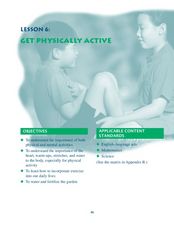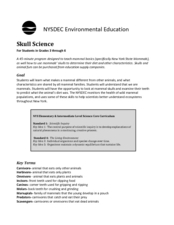Curated OER
Physical Science: The Three Billy Goats Gruff
Explore science through problem solving and learning how to solve the problem of the story "The Three Billy Goats Gruff." Young investigators will learn how to construct a model and design a solution. They will also keep records of their...
Discovery Education
The Everyday Science of Sports
Physical science juniors will enjoy this sensational enrichment on aerodynamics, especially if they are also sports fans! With a focus on physical features and behaviors, collaborative groups make observations on five different golf...
Center for Learning in Action
Investigating Physical and Chemical Changes
Super scientists visit ten stations to predict, observe, and draw conclusions about the physical and chemical changes that occur when different states of matter—liquid, solid, and gas—are placed under a variety of conditions. To...
American Chemical Society
Mysterious M&M's
The first in a six-lesson mini unit, all using M&Ms® candies, this physical science activity gets kids to observe a single piece and discover what happens when it is placed in a plate of water. The activity can be used to introduce...
Center for Learning in Action
Introducing Physical and Chemical Changes
Young scientists investigate chemical and physical changes to the states of matter—gas, liquid, and solid—as well as solutions and suspensions with a variety of demonstrations, grand conversation, and an interactive quiz to check for...
Baylor College
Fuel for Living Things
During a three-part lesson, learners make a cabbage juice pH indicator and use it to analyze the waste products of yeast after feeding them with sugar. The intent is to demonstrate how living organisms produce carbon dioxide, which is...
Curated OER
Physical Science: Festival of Bubbles
Investigate bubbles through the use of scientific inquiry. Pupils blow bubbles using several methods and measure the resulting bubble print. Measurements are recorded on a data table and transferred to a bar graph. Results are discussed...
Institute of Electrical and Electronics Engineers
Spring Scale Engineering
After examining how a spring scale works, teams work together to design their own general measurement device. Reading material provides background information, but there is no part of the procedure in which learners handle an actual...
Curated OER
The Physics of Toys
Students explore physics by experimenting with classic toys. In this physical science lesson, students utilize gliders, energy balls, bouncing balls, marbles and other toys to explore how they work. Students explore each toy at a work...
American Chemical Society
Evaporation
This is one in several lessons that explore the relationship between temperature and phase changes of water. After some discussion, elementary physical scientists place wet paper toweling on a hot and a room-temperature water bag and...
Curated OER
Rocket Science
Learners conduct an experiment. In this physical science lesson, students learn about Isaac Newton's theory that for every action there is an equal but opposite reaction. Learners show this theory by looking at how a rocket is propelled...
Curated OER
Physical Changes and States of Matter
Fourth graders identify a physical change as one that results in a change in size, shape, or state of matter. After an initial teacher-led discussion and demonstration, groups of students get together to perform an experiment which...
Cornell University
Physics of Flight
Up, up, and away! Take your classes on a physics adventure. Learners explore the concepts important for flight. They experiment with the Bernoulli Principle while learning the forces that act on airplanes in flight.
Baylor College
How Can We Find Out What Is in Water?
Using paper chromatography, water watchers discover that several substances might be dissolved even though they aren't visible. In this case, you will prepare a mixture of three different food colorings for them to experiment with. A...
Foundation for Water & Energy Education
How is Flowing Water an Energy Source? Activity B
Explore the world's water without leaving the classroom! In this second of three uncomplicated but wonderful activities, physical science learners feel the pressure of water. They discover that the deeper the water, the stronger the...
Curated OER
Get Physically Active
Students discover the importance of water. In this physical education science lesson, students consider mental and physical activities. Students find their pulse and measure their heart rate. Students discuss the importance of water...
Curated OER
The Physics of Flight
Three activities allow young flight engineers to understand the 4 principles of flight (weight, lift, thrust, and drag), to construct a glider, and to create a propeller. Multicultural history and literature are integrated by reading...
Curated OER
Physical Education: Mission Possible
Students participate in a physical education activity, Mission Possible, where they attempt to steal a jug of jewels. They must successfully overcome five challenge areas to complete the activity. Students develop cooperative...
Curated OER
Skull Science
What can your class learn from a skull? With proper facilitation, they can learn about diet, physical adaptations, special differences, and even the environment. Pupils will examine a series of mammal skulls and pelts to help them...
Institute of Electrical and Electronics Engineers
Build Your Own Robot Arm
Engineers team up to design and construct an 18-inch-long robotic arm that can successfully pick up a paper cup. Each group is given the exact same set of materials, but it is up to them to decide what to use and how to use it. It is a...
Institute of Electrical and Electronics Engineers
Can You Canoe?
A neat handout immerses learners in the history of canoe making. After reading, small groups of mini engineers work to craft a canoe that will not be immersed! This is an ideal exercise in engineering design for your STEM curriculum or...
Agriculture in the Classroom
Six Kinds Do It All
Teach young engineers that all machines, no matter how complicated or complex, are made up of just six simple devices with this hands-on physical science lesson. Using the included templates, students first create paper models of...
NOAA
Into the Deep
Take young scientists into the depths of the world's ocean with the second lesson plan of this three-part earth science series. After first drawing pictures representing how they imagine the bottom of the ocean to appear, students...
American Chemical Society
Exploring Moisture on the Outside of a Cold Cup
As a stand-alone or as part of the intended unit, this is a valid investigation of what causes condensation to occur. By limiting the amount of air around a cold cup of water and comparing it to one out in the open, they find that the...
Other popular searches
- 4th Grade Physical Science
- Physical Science Matter
- Elementary Physical Science
- Physical Science Projects
- Physical Science "Motion
- Physical Science Activities
- Physical Science Lessons
- Physical Science "Motion"
- 5e Physical Science Lessons
- Physical Science Space
- Physical Science Technology
- Physical Science Content
























